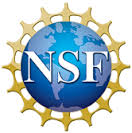U.S. National Science Foundation

The National Science Foundation (NSF) is an independent federal agency created by Congress in 1950 “to promote the progress of science; to advance the national health, prosperity, and welfare; to secure the national defense…” With an annual budget of $7.2 billion (FY 2014), we are the funding source for approximately 24 percent of all federally supported basic research conducted by America’s colleges and universities. In many fields such as mathematics, computer science and the social sciences, NSF is the major source of federal backing.
We fulfill our mission chiefly by issuing limited-term grants — currently about 11,000 new awards per year, with an average duration of three years — to fund specific research proposals that have been judged the most promising by a rigorous and objective merit-review system. Most of these awards go to individuals or small groups of investigators. Others provide funding for research centers, instruments and facilities that allow scientists, engineers and students to work at the outermost frontiers of knowledge.
What we do
NSF is the only federal agency whose mission includes support for all fields of fundamental science and engineering, except for medical sciences. NSF is tasked with keeping the United States at the leading edge of discovery in a wide range of scientific areas, from astronomy to geology to zoology. So, in addition to funding research in the traditional academic areas, the agency also supports “high risk, high pay off” ideas, novel collaborations and numerous projects that may seem like science fiction today, but which the public will take for granted tomorrow. And in every case, we ensure that research is fully integrated with education so that today’s revolutionary work will also be training tomorrow’s top scientists and engineers.
Unlike many other federal agencies, NSF does not hire researchers or directly operate our own laboratories or similar facilities. Instead, we support scientists, engineers and educators directly through their own home institutions (typically universities and colleges). Similarly, we fund facilities and equipment such as telescopes, through cooperative agreements with research consortia that have competed successfully for limited-term management contracts.
NSF’s job is to determine where the frontiers are, identify the leading U.S. pioneers in these fields and provide money and equipment to help them continue. The results can be transformative. For example, years before most people had heard of “nanotechnology,” NSF was supporting scientists and engineers who were learning how to detect, record and manipulate activity at the scale of individual atoms–the nanoscale. Today, scientists are adept at moving atoms around to create devices and materials with properties that are often more useful than those found in nature. Dozens of companies are gearing up to produce nanoscale products. NSF is funding the research projects, state-of-the-art facilities and educational opportunities that will teach new skills to the science and engineering students who will make up the nanotechnology workforce of tomorrow.
At the same time, we are looking for the next frontier.


